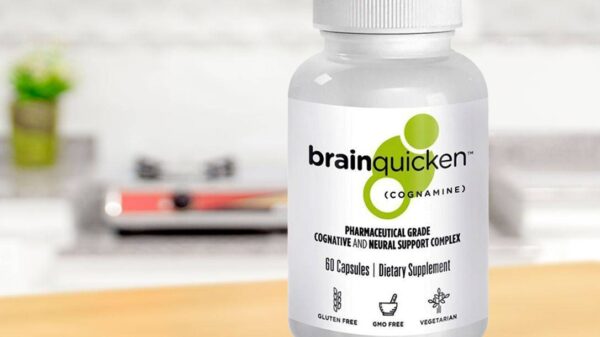Our full Steel Focus review will focus on giving comprehensive answers to some of the most frequently asked questions about Enervitus Nutrition Steel Focus. Throughout this review, we will see some details behind the producing company (other supplements made by the company, what customers say about Enervitus Nutrition, contact information, and more) and we will review some of the core ingredients and their vital role in the overall formulation.
Our Steel Focus review will continue with more information regarding potential side effects, price, and best stores to buy from, claimed benefits, effectiveness, as well as some good alternatives to this nootropic brain booster.
What Is Steel Focus?
Steel Focus is a cognitive nootropic brain booster designed to improve focus, memory, mood, attention, and boost overall cognitive performance. Steel Focus is made by the U.S company Enervitus Nutrition and is a good example of a formula with huge potential but very few actual accomplishments.
This nootropic contains what the manufacturer calls “a maximum strength formula.” Sold in 60-capsules bottles, Steel Focus includes several premium ingredients. Each ingredient was clinically tested in a GMP certified facility to ensure safety and purity.
Who Makes It?
There isn’t much to say about Enervitus Nutrition. The company doesn’t have much of an online presence at all. They have, however, a decent website that offers a good amount of information on the company’s profile and its products. But that’s all the positives. Their social pages are uninteresting and deserted (the Facebook page, for instance, hasn’t been updated since 2018).
Enervitus Nutrition contact information:
- Address: 9722 Gaston Rd Suite # 150-3 Katy, TX 77494
- Email: support@enervitusnutrition.com
- Website: go.enervitusnutrition.com (Shopify store)
Steel Focus Ingredients
The following section of our Enervitus Nutrition Steel Focus review will focus on what’s actually inside the formulation, starting with some of the critical ingredients and finishing with a detailed list of other active ingredients, as well as all inactive ingredients included in the formulation.
Steel Focus includes the following active ingredients per serving:
- St. John’s Wort (0.3% extract) (flower heads) 250 mg
- L-Glutamine 150 mg
- Phosphatidylserine 4% Complex (consisting of Lecithin and Phosphatidylserine) 125 mg
- Bacopa Monnieri leaf extract (20% bacosides) 120 mg
- Ginkgo Biloba leaf (24% extract) 50 mg
- N-Acetyl L-Carnitine HCl 50 mg
- Vinpocetine (seeds) 2 mg
- Huperzine-A (aerial plant) 10 mcg
Inactive ingredients include gelatin (bovine), microcrystalline cellulose, vegetable magnesium stearate, and silicon dioxide.
What Is Acetyl-L-Carnitine?
The low dose Acetyl-L-Carnitine (ALCAR) is a bit of a disappointment. The 50 mg is simply not enough, as ALCAR requires a significantly higher dose to work properly. And when it works, Acetyl-L-Carnitine has been shown to improve memory problems in older people, reduce tiredness, improve blood flow to the brain, help symptoms related to declining male hormone levels, and might slow the rate of disease progression in some patients with Alzheimer’s disease.
But again, you need a much higher dose of Acetyl-L-Carnitine for any of the benefits mentioned above to happen. For instance, for age-related memory loss, 1,500 – 2,000 mg of ALCAR is recommended daily.
Is Huperzine A Safe?
Huperzine A is a chemical extract from the Chinese club moss plant and it’s quite different from most herbal extracts. While it originates from a plant, the final compound is isolated and highly purified in the lab. As a result, many see Huperzine A as more of a drug or synthetic ingredient than an herbal extract and argue that it shouldn’t even be considered a dietary supplement. I completely agree with that statement.
Regarding its benefits, Huperzine A is a controversial ingredient. The compound is commonly used to improve memory and mental function in people with Alzheimer’s disease, age-related memory loss, dementia, and other conditions.
Some use Huperzine A to enhance learning abilities, focus, and retention, especially during long study sessions. However, most of these benefits haven’t been studied enough, and the results are still inconclusive.
Furthermore, Huperzine A may interact with a wide range of dietary supplements and prescription medication.
Why Phosphatidylserine 4%?
Phosphatidylserine 4% – The standard 4% Phosphatidylserine is not something you want to see in a nootropic supplement. Phosphatidylserine is commonly regarded as one of the best nootropics available, but it needs to be in a much higher concentration than 4%.
Phosphatidylserine is used to improve cognitive clarity and longevity by enhancing neuron-to-neuron communication and cell membrane integrity.
Some Other Potent Herbal Extracts
Bacopa Monnieri (also known as Brahmi) is a remarkable Ayurvedic adaptogenic herb and one of the most commonly used herbal extracts in nootropics.
This plant extract is used to improve memory and learning, apparently supporting cognition by inhibiting acetylcholinesterase, the enzyme responsible for breaking down the neurotransmitter acetylcholine.
Bacopa Monnieri is also a source of powerful antioxidants that help protect against cell damage caused by potentially harmful molecules called free radicals.
St. John’s Wort is the highest dosed ingredient in this nootropic brain booster. A powerful mood enhancer, St. John’s Wort is commonly used to support mood, and reduce stress and anxiety.
However, St. John’s Wort can interact with antidepressant medication, the reason why it’s never recommending supplementing with this particular herbal extract if you’re also on pharmaceutical antidepressants.
Ginkgo Biloba is one of the oldest nootropic plants on Earth. But is Ginkgo Biloba a good nootropic herb? Yes, it is, especially at this standardized 24% extract.
Clinical studies have shown that Ginkgo extract may improve circulation, thereby increasing the delivery of nutrients and oxygen to the brain. Ginkgo’s benefits on memory are still under study.
Steel Focus Side Effects
While, according to Enervitus Nutrition, Steel Focus is claimed to be perfectly safe to use when taken as recommended, the formula contains several ingredients that have been associated with a number of mild to moderate side effects.
Acetyl-L-Carnitine can cause some side effects including nausea, headaches, vomiting, upset stomach, dry mouth, and restlessness. It can also cause a “fishy” odor of the urine, breath, and sweat.
Huperzine A is one of the more dangerous ingredients. It can cause adverse effects such as inability to control urination, blurred vision, contraction, and twitching of muscle fibers, nausea, sweating, loss of appetite, diarrhea, vomiting, restlessness, slurred speech, cramping, increased saliva and urine, high blood pressure, and slowed heart rate.
How Much Does It Cost?
One bottle of Steel Focus costs $17.99, and each bottle contains 30 capsules (30 servings). At around 60 cents per serving, Steel Focus is one of the cheapest nootropic brain enhancers available on the market.
Where To Buy Steel Focus?
Enervitus Nutrition sells through Amazon. However, most of their products get constantly delisted or are “Out of Stock.” They also have a Shopify store, which seems to indicate that some sort of “dropshipping” deal is going on.
Steel Focus Review – Pros & Cons
Pros
Cons
Customer Testimonials
I have been taking Enervitus Steel Focus. This is a great product, I use it on a daily basis. Since using it I noticed I am able to focus more. I have a more intense focus when it comes to tasks like keeping up with my business or retaining information.
Alternatives?
The brain supplement market offers plenty of interesting alternatives to Enervitus Steel Focus.
Qualia Mind made by Neurohacker Collective – this nootropic supplement claims to improve memory, focus, mental energy, and concentration. The whole formula is built around five potent ingredients: Ginkgo Biloba, Bacopa Monnieri, Alpha GPC, Acetyl-L-Carnitine, and DHA.
Neurohacker Collective Qualia Mind claimed benefits include:
- Science-backed nootropic formulation;
- Top-quality ingredients;
- 100% vegan, non-GMO, gluten-free;
- Specially designed to promote brain wellbeing.
Neuro-Peak made by Zhou Nutrition – With more than 7,000 reviews on Amazon and averaging a 3.8 rating, Neuro Peak is one of the best selling nootropics in the United States. Its potent formula contains DMAE, Bacopa Monnieri, Rhodiola Rosea, and Ginkgo Biloba and, according to Zhou Nutrition, it was “scientifically formulated for optimal brain performance.”
Zhou Nutrition Neuro Peak claimed benefits include:
- Lab verified formulation;
- Scientifically formulated for optimal brain performance;
- Convenient once-daily dose;
- Uses only the highest-quality ingredients.
Brain Booster made by Vital Vitamins – This best selling Ginkgo Biloba-based nootropic supplement comes with a very competitive price – $21.87 / bottle (73 cents per serving). Brain Booster is recommended to both men and women and, unlike other nootropics, it packs only seven ingredients: Vitamin B12, Ginkgo Biloba, Brahmi, DMAE, Rhodiola Rosea, and Phosphatidylserine.
Vital Vitamins Brain Booster claimed benefits include:
- Non-GMO ingredients;
- Lab verified formulation;
- Enhances brain health and memory;
- Reduces mental fogginess and fatigue.
Enervitus Nutrition Steel Focus Review – Conclusion
Enervitus Nutrition Steel Focus supplies a very traditional ingredient profile shared by many nootropic brands that are marketed on Amazon (and abroad).
I’m not saying that every company has to reinvent the wheel with each newly released formulation. But it’s a little strange that so many nootropics are using the same formula, down to the exact amount of each included ingredient.
Why are they doing that? Best case scenario: because the formula is great, and it works. And, to be honest, many of the ingredients in this formula are generally OK. But some also are not.
If you’re in the market for some decent nootropic, my recommendation is finding a product that has all the proper ingredients and none of the bad ones (i.e., Huperzine A).
Frequently Asked Questions
Sources
- Acetyl-L-Carnitine – webmd.com. Retrieved on January 12, 2021. [Source]
- Rudy Mawer – L-Carnitine: Benefits, Side Effects, Sources, and Dosage. Article published on November 6, 2018. Retrieved on January 12, 2021. [Source]
- Huperzine A: Can it treat Alzheimer’s? – mayoclinic.org. Retrieved on January 12, 2021. [Source]
- Huperzine-A – examine.com. Research analysis led by Kamal Patel. Retrieved on January 12, 2021. [Source]
- Zhong Ming Qian and Ya Ke – Huperzine A: Is it an Effective Disease-Modifying Drug for Alzheimer’s Disease? Published online on August 19, 2014. Retrieved on January 12, 2021. [Source]
- Huperzine A – alzdiscovery.org. Retrieved on January 12, 2021. [Source]
- Huperzine A – drugs.com. Last updated on September 2, 2019. Retrieved on January 12, 2021. [Source]
- Furman L. – What is attention-deficit hyperactivity disorder (ADHD)? Published in December 2005. Retrieved on January 12, 2021. [Source]
- Dave U.P., Dingankar S.R., Saxena V.S., Joseph J.A., Bethapudi B., Agarwal A., and Kudiganti V. – An open-label study to elucidate the effects of standardized Bacopa monnieri extract in the management of symptoms of attention-deficit hyperactivity disorder in children. Published in 2014. Retrieved on January 12, 2021. [Source]
- Peth-Nui T., Wattanathorn J., Muchimapura S., Tong-Un T., Piyavhatkul N., Rangseekajee P., Ingkaninan K., and Vittaya-Areekul S. – Effects of 12-Week Bacopa monnieri Consumption on Attention, Cognitive Processing, Working Memory, and Functions of Both Cholinergic and Monoaminergic Systems in Healthy Elderly Volunteers. Published on December 18, 2012. Retrieved on January 12, 2021. [Source]
- Rai D., Bhatia G., Palit G., Pal R., Singh S., and Singh H.K. – Adaptogenic effect of Bacopa monniera (Brahmi). Published in July 2003. Retrieved on January 12, 2021. [Source]
- St. John’s Wort and Depression: In-Depth – National Center for Complementary and Integrative Health (NCCIH). Retrieved on January 12, 2021. [Source]
- St. John’s Wort – webmd.com. Retrieved on January 12, 2021. [Source]
- John P. Cunha – Ginkgo Biloba. Retrieved on January 12, 2021. [Source]
- Ginkgo Biloba – American Family Physician. Article published on September 1, 2003. Retrieved on January 12, 2021. [Source]
- Enervitus Nutrition Facebook Page. Retrieved on January 12, 2021. [Source]
- Enervitus Nutrition Amazon Store Page. Retrieved on January 12, 2021. [Source]







